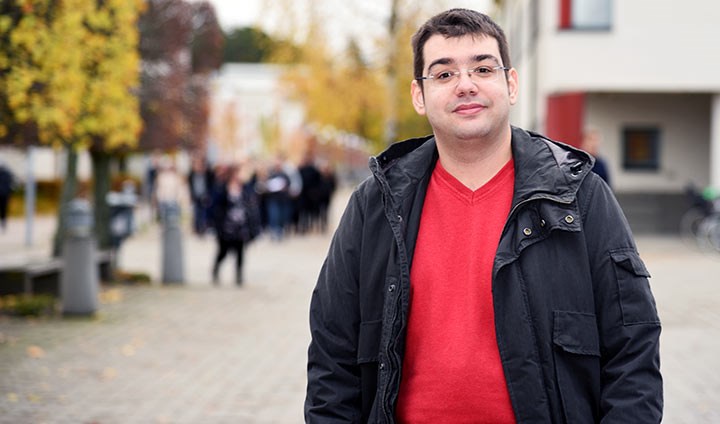Researching technical solutions for sufferers of dementia

Even persons suffering from dementia and Alzheimer’s should be able to have their voices heard. This is the starting point for Antonios Tsertsidis’s research on assistive technology for the elderly. “It is likely that my grandmother is suffering from Alzheimer’s, thus, my interest in the subject,” he says.
The background for his study is that the proportion of elderly in our society is on the rise. We are living longer, and when staffing within healthcare is not sufficient, then technical solutions are required to meet the healthcare demands of the elderly. The need for so-called assistive technology is already high, but will be even greater in the future.
“Assistive technology allows the elderly to live at home as long as possible. This could mean a digital social care alarm or technology which helps them to remember to take their medicine, to call their family or the municipal care staff,” explains Antonios Tsertsidis’s, whose research subject is informatics.
Pay more attention to the elderly
He has studied how technology is received and used by the elderly – and how it may be adapted to their needs. However, he believes that companies producing assistive technology should pay more attention to what the elderly think about their products. The same can even be said for decision makers within healthcare and care of the elderly.
“Since the elderly are important users of technological solutions introduced into healthcare, it is important to ask what they think. However, this is not always the case.”
Antonios Tsertsidis’s has chosen to focus on the elderly suffering from dementia and Alzheimer’s – cognitive diseases which are becoming more and more common with the average age increasing the population.
“Their voices should be heard regarding how such technology is designed. So, this is my focus,” says Antonios Tsertsidis’s, and continues, “It has been shown that persons suffering from dementia and Alzheimer's disease are not included in research, because of the ethical issues associated with interviewing them. Therefore, more research is necessary in order to satisfactorily determine the needs of this group.”
Grandmother a likely sufferer
One of the reasons behind Antonios Tsertsidis’s interest in the area is that his own grandmother is likely at an early stage of Alzheimer’s disease.
“She forgets a lot and is only able to concentrate a short while without before losing focus. It is what is happening to her that has kindled my interest.”
His research project, “Ageing in place”, started in autumn 2016 and he is currently in the process of preparing an application to the Ethical Review Board. If approved, his interviewing of the elderly can begin. Antonios Tsertsidis’s is cooperating with Örebro Municipality to find people to participate in the study.
Is there difficulty in interviewing this group?
“We will be focusing on persons who are at an early stage of dementia and Alzheimer’s. At this stage they have their limitations, but also have moments when they are symptom free.”
The plan is to also include occupational therapists and family members to the elderly persons in the study. In total, he is counting on between 20 and 30 persons.
If everything goes as planned, the interviews with begin in spring 2018. Afterwards, the same study will be performed in Antonios Tsertsidis’s native country, Greece. The purpose is to compare the differences between the two countries, above all with regards to how well technology is accepted among the elderly with dementia.
And what is the primary objective of your research?
“The primary objective of the research is to provide specific guidelines to companies developing products intended for this group. To describe characteristics which they should be paying attention to, so that technologies will be accepted.”
Translation: Jerry Gray
